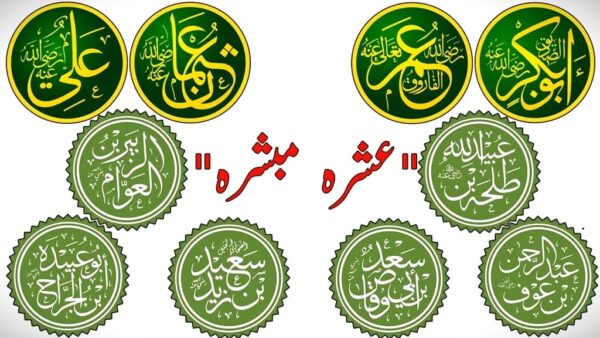Introduction
In Islamic history, the Ashra Mubashra (The Ten Glad-Tidings) hold a sacred position as companions of Prophet Muhammad (SAW) who were promised Jannah in their lifetimes. Their unwavering faith, sacrifices, and leadership shaped the foundation of Islam. This blog delves into their extraordinary lives, virtues, and legacies, offering timeless lessons for humanity. But first let’s understand the meaning of “Ashra Mubashra”.
Origin of “Ashra Mubashra”
The term Ashra Mubashra originates from Arabic, where Ashra means “ten” and Mubashra translates to “glad tidings” or “good news.” Historically, this phrase is associated with a distinguished group of ten companions of the Prophet Muhammad who were promised Paradise, reflecting their exceptional faith and dedication. This designation goes beyond a simple title—it symbolizes the profound hope and reward that come from steadfast commitment to Islamic teachings. In the broader context of Islamic history and culture, Ashra Mubashra serves as a powerful reminder that sincere devotion and moral integrity are celebrated and ultimately rewarded, inspiring generations of Muslims to pursue a life of righteousness.
The Promise of Paradise — In Hadith Perspective
The Prophet (SAW) declared:
“Abu Bakr will be in Paradise, ‘Umar will be in Paradise, ‘Uthman will be in Paradise, ‘Ali will be in Paradise, Talha will be in Paradise, Az-Zubair will be in Paradise, ‘Abdur-Rahman bin ‘Awf will be in Paradise, Sa’d bin Abi Waqqas will be in Paradise, Sa’id bin Zaid will be in Paradise, and Abu ‘Ubaidah bin Al-Jarrah will be in Paradise.” (Sunan At-Tirmidhi 3747).
These ten men embodied the Quranic ideal of “the foremost believers” (Quran 56:10). Let us explore their luminous stories.
1. Abu Bakr As-Siddiq (RA): The Unshakable Truthful
Story of Unwavering Loyalty and Generosity
Abu Bakr’s devotion to the Prophet Muhammad was evident from the very beginning. When the Prophet received divine revelation and began preaching the message of Islam, many were hesitant to embrace this new way of life. However, Abu Bakr’s trust in the Prophet’s words was absolute. His generosity was legendary—he sold his property to support the cause of Islam, and he accompanied the Prophet during the migration (Hijrah) from Mecca to Medina. This selfless commitment not only secured the survival of the early Muslim community but also set a precedent for sacrifice and loyalty.
Key points:
- Early Life: A wealthy Qurayshi merchant, Abu Bakr (RA) was the first adult male to embrace Islam. His title As-Siddiq (The Truthful) reflects his immediate belief in the Prophet’s Night Journey (Isra’).
- Sacrifices: He freed enslaved Muslims like Bilal (RA) and donated his entire wealth for Islam.
- Leadership: As the first Caliph, he unified Arabia during the Ridda Wars and initiated the Quran’s compilation.
- Death: Passed away in 634 CE after a two-year reign. Buried beside the Prophet (SAW) in Madinah.
Prophetic Praise:
“If I were to take a Khalil (close friend), it would be Abu Bakr.” (Sahih Bukhari).
2. Umar ibn Al-Khattab (RA): The Distinguisher of Truth
Story of Justice and Courage
Umar ibn al-Khattab’s transformation from a fierce opponent of Islam to one of its most devoted supporters is a powerful testament to the transformative power of faith. Known for his strong sense of justice and unwavering courage, Umar’s leadership after the Prophet’s time helped shape the nascent Muslim state. His fair judgments, coupled with his personal humility, earned him the respect of both his peers and the people he governed. One famous story recounts how his stern yet fair treatment of even the most influential individuals underscored his belief in equality before God.
Key points:
- Conversion: His acceptance of Islam marked a turning point, enabling Muslims to pray openly at the Kaaba.
- Bravery: Migrated to Madinah publicly, challenging Quraysh to confront him.
- Reforms: As Caliph (634–644 CE), he established systems like the Diwan (state treasury) and expanded Islamic rule into Persia and Byzantium.
- Legacy: Martyred by a Persian assassin; buried next to the Prophet (SAW).
Prophetic Insight:
“Among the nations before you, there were ‘muhaddathun’ (inspired people). If any remain in my Ummah, it is ‘Umar.” (Sahih Bukhari).
3. Uthman ibn Affan (RA): The Possessor of Two Lights
Story of Compassion and Commitment
Uthman was renowned for his generosity and deep commitment to the Muslim community. His compassion was not only evident in his financial support for Islamic causes but also in his meticulous work on compiling the Quran into a single, standardized text—a monumental task that preserved the sacred words for future generations. Uthman’s life was a reflection of his belief in serving others, and his quiet determination left an enduring legacy of dedication and piety.
Key points:
- Virtues: Married to the Prophet’s daughters Ruqayyah (RA) and Umm Kulthum (RA), earning him Dhun-Nurayn (Possessor of Two Lights).
- Contributions: Funded the Battle of Tabuk and standardized the Quran into the Mushaf Uthmani.
- Martyrdom: Assassinated in 656 CE while reciting the Quran. Buried in Jannat al-Baqi.
Prophetic Affection:
“Shall I not be shy of a man whom the angels are shy of?” (Sahih Muslim), referring to Uthman (RA).
4. Ali ibn Abi Talib (RA): The Lion of Allah
Story of Wisdom and Bravery
As one of the earliest converts to Islam and a member of the Prophet’s family, Ali’s role in the early battles and his wise counsel during challenging times became legendary. His bravery was matched by his depth of knowledge and justice. Numerous accounts detail how Ali’s decisions during conflicts and his fair treatment of even adversaries demonstrated a commitment to the principles of Islam. His life is remembered as a perfect blend of martial valor and spiritual insight.
Key points:
- Early Devotion: Raised by the Prophet (SAW), he embraced Islam at 10 and risked his life during the Hijra by sleeping in the Prophet’s bed.
- Valor: Conquered Khaybar and led forces in battles like Badr and Uhud.
- Caliphate: Ruled from 656–661 CE, emphasizing justice and scholarship.
- Martyrdom: Fatally wounded by a Kharijite in 661 CE; buried in Najaf, Iraq.
Prophetic Wisdom:
“You are to me as Aaron was to Moses, except there will be no prophet after me.” (Sahih Bukhari).
5. Talha ibn Ubaydullah (RA): The Living Martyr
Story of Sacrifice and Devotion
Talha’s steadfast loyalty was vividly illustrated during the battles fought by the early Muslims. His readiness to sacrifice his life in the service of Islam was evident when he risked everything to protect the Prophet during critical moments, such as at the Battle of Uhud. Talha’s actions reflect the profound sense of duty and the unconditional love he held for the Prophet and the cause of Islam, which continues to inspire Muslims to embody selflessness and courage.
Key points:
- Generosity: Funded the Uhud expedition and shielded the Prophet (SAW) with his hand, leaving it paralyzed.
- Martyrdom: Died defending Aisha (RA) in the Battle of the Camel (656 CE). Buried in Basra.
Prophetic Gratitude:
“Whoever wishes to see a martyr walking on earth, let him look at Talha.” (Jami` at-Tirmidhi).
6. Zubair ibn Al-Awwam (RA): The Disciple of the Prophet
Story of Early Embrace and Courage
Zubayr’s early acceptance of Islam, despite the social and political risks, marks him as one of the faith’s earliest champions. His active participation in key battles showcased his formidable courage and strategic insight. Zubayr was not only a warrior but also a trusted advisor to the Prophet, whose loyalty and dedication were unwavering. His life story remains a beacon of the transformative power of faith when coupled with personal valor.
Key points:
- Courage: Among the first five Muslims, he fought in every major battle, recognizable by his yellow turban.
- Legacy: A key figure in the Battle of the Camel (656 CE), where he was martyred while praying.
Prophetic Bond:
“Every prophet has a disciple; mine is Az-Zubair.” (Al-Isabah fi Tamyiz as-Sahabah).
7. Abdur Rahman ibn Awf (RA): The Philanthropist
Story of Wealth for the Sake of Faith
Abdur Rahman ibn Awf is celebrated not just for his prosperity but for the manner in which he used his wealth. Recognizing that material resources were a means to further the cause of Islam, he was known for his immense generosity—supporting the poor, funding expeditions, and relieving the burdens of those in need. His life exemplified how wealth, when used selflessly, becomes a tool for communal upliftment and spiritual reward.
Key points:
- Wealth & Charity: Donated 400 camels and 40,000 dinars in one act. A key advisor to early caliphs.
- Death: Passed away in 652 CE; buried in Jannat al-Baqi.
Prophetic Du’a:
The Prophet (SAW) prayed for his wealth to be blessed, a prayer abundantly fulfilled.
8. Sa’d ibn Abi Waqqas (RA): The Conqueror of Persia
Story of Early Conversion and Military Prowess
Sa’d ibn Abi Waqqas was among the first to embrace Islam and quickly became known for his steadfast faith and exemplary military skills. His leadership in key battles, notably during the conquest of Persia, underscored his strategic acumen and deep commitment to Islam. Sa’d’s ability to blend spiritual devotion with practical leadership serves as a model for balancing piety with action in times of both peace and conflict.
Key points:
- Archery: The Prophet (SAW) hailed him as the “best archer.” Founded Kufa and led the decisive Battle of Qadisiyyah (636 CE).
- Legacy: Introduced Islam to China; the Huaisheng Mosque in Guangzhou is attributed to his mission.
Prophetic Blessing:
“O Allah, make his arrow accurate and answer his prayer!” (Al-Bidayah wan-Nihayah).
9. Sa’id ibn Zaid (RA): The Advocate of Justice
Story of Loyalty and Endurance
Saeed ibn Zaid was recognized for his unwavering loyalty to the Prophet and his determination in the face of adversity. His participation in early battles and his consistent support for the Muslim community highlighted a life dedicated to the principles of Islam. Saeed’s story is one of quiet endurance and steadfast commitment, reflecting the inner strength required to uphold faith under challenging circumstances.
Key points:
- Early Conversion: Among the first ten Muslims; husband to Umar’s (RA) sister Fatimah.
- Governance: Served as governor of Kufa under Caliph Muawiyah (RA).
- Death: Passed away in 673 CE; buried in Madinah.
Prophetic Assurance:
The Prophet (SAW) guaranteed him Paradise alongside his wife.
10. Abu Ubaidah ibn Al-Jarrah (RA): The Trustworthy of the Ummah
Story of Humble Leadership and Trust
Abu Ubaidah ibn al-Jarrah’s leadership was characterized by humility and an unwavering sense of duty. Often referred to as the “Amin” (trustworthy) of his time, his reliability and simplicity made him one of the Prophet’s most trusted companions. His strategic contributions during military campaigns and his calm, collected nature in times of crisis exemplify a leadership style that valued integrity over personal glory. His life reminds us that true leadership is rooted in trust and selfless service.
Key points:
- Leadership: Commander in battles like Yarmouk (636 CE), which opened Syria to Islam.
- Death: Died in the Plague of Amwas (639 CE); buried in Jordan.
Prophetic Acclaim:
“Every Ummah has a trustee; ours is Abu Ubaidah.” (Sahih Bukhari).
Frequently Asked Questions
1. What does the term “Ashra Mubashra” mean?
Answer: The Arabic phrase عشرة مبشّرة (Ashra Mubashra) translates to “The Ten Given Glad Tidings.” “Ashra” means ten, and “Mubashra” refers to those who received direct news (from the Prophet Muhammad ﷺ) of their guaranteed entry into Paradise. This title is based on authentic Hadiths where the Prophet ﷺ named these companions individually.
Reference: Sunan al-Tirmidhi (Hadith 3747): The Prophet ﷺ listed the ten by name, saying, “Abu Bakr is in Paradise, ‘Umar is in Paradise…”
2. Who are the Ashra Mubashra?
Answer: They are ten elite companions of the Prophet ﷺ:
- Abu Bakr As-Siddiq (RA)
- Umar ibn Al-Khattab (RA)
- Uthman ibn Affan (RA)
- Ali ibn Abi Talib (RA)
- Talha ibn Ubaydullah (RA)
- Zubair ibn Al-Awwam (RA)
- Abdur Rahman ibn Awf (RA)
- Sa’d ibn Abi Waqqas (RA)
- Sa’id ibn Zaid (RA)
- Abu Ubaidah ibn Al-Jarrah (RA).
Each played pivotal roles in early Islamic history as leaders, warriors, and scholars.
3. Which sources confirm the Ashra Mubashra?
Answer: The Hadith collections of Sahih al-Bukhari, Sahih Muslim, Sunan al-Tirmidhi, and Musnad Ahmad mention their status. Classical scholars like Ibn Hajar al-Asqalani (Al-Isabah fi Tamyiz as-Sahabah) and Ibn Kathir (Al-Bidayah wan-Nihayah) also detail their lives. Key hadith: Sunan al-Tirmidhi 3747: The Prophet ﷺ explicitly names all ten (scroll above to see the full Hadith).
4. Why were they specifically promised Paradise?
Answer: Their unparalleled faith, sacrifices, and service to Islam distinguished them. For example:
- Abu Bakr (RA) spent his entire wealth to free persecuted Muslims.
- Umar (RA) established equitable governance across the caliphate.
- Uthman (RA) compiled the Quran into a standardized text.
Quranic Principle: Their lives embodied “the foremost in faith” (Quran 56:10) and “those who spend in ease and hardship” (Quran 3:134).
5. Is this promise mentioned in the Quran?
Answer: No, the Quran does not name individuals. However, Allah praises the Sahabah (companions) collectively:
“Allah is pleased with them, and they are pleased with Him. He has prepared for them Gardens under which rivers flow” (Quran 9:100).
The specific promise to the ten derives from authenticated Hadiths.
6. Are there debates about the list of ten?
Answer: Most Sunni scholars unanimously agree on the ten names. However, minor variations appear in some historical texts, such as Tabaqat ibn Sa’d, which occasionally includes others like Abu Dhar al-Ghifari (RA). These discrepancies are rare and do not challenge the widely accepted list.
7. How do their lives inspire Muslims today?
Answer: The exemplary lives of these noble companions continue to inspire Muslims by embodying virtues that are essential for a faith-driven life. Their unwavering commitment to leadership, sacrifice, and generosity offers practical examples of how to live with integrity and devotion. These enduring qualities are celebrated in Islamic tradition and serve as timeless reminders of the values upheld in the Quran and Hadith. For example:
- Leadership: Umar’s (RA) administrative reforms model justice and accountability.
- Sacrifice: Ali (RA) risked his life for the Prophet’s ﷺ safety during the Hijra.
- Generosity: Abdur Rahman ibn Awf (RA) donated vast wealth for communal welfare.
Modern Lesson: The Quran urges Muslims to “follow the way of those who turn to Allah” (Quran 31:15), encouraging believers to incorporate these virtues into their everyday lives.
8. How were the Hadiths about them authenticated?
Answer: Scholars used ‘ilm al-rijal (study of narrators) and isnad (chain) analysis. For example, the Hadith in Sunan al-Tirmidhi is graded hasan sahih (reliable) due to its strong narrators like Qays ibn Abi Hazim.
Reference: Tahdhib al-Tahdhib by Ibn Hajar: Biographies of Hadith narrators.
9. What is the significance of the number ten?
Answer: In Islamic tradition, ten often symbolizes divine completeness:
- Ten days of Dhul-Hijjah (Quran 89:2).
- Ten nights referenced in Surah Al-Fajr (89:1-2).
- Ten promised Paradise reflects their perfected faith.
10. Where can I learn more about their biographies?
Recommended Sources:
- Al-Isabah fi Tamyiz as-Sahabah(Ibn Hajar al-Asqalani).
- The Companions of the Prophet(Abdulwahid Hamid).
- Siyar A’lam an-Nubala(Imam al-Dhahabi).
- Online: Sunnah.com (Hadith databases).
11. Did any Ashra Mubashra face conflicts among themselves?
Answer: Yes, Talha (RA), Zubair (RA), and Ali (RA) were involved in the Battle of the Camel (656 CE). However, their disagreements were rooted in ijtihad (scholarly interpretation), not personal animosity. All sought justice, and their mutual respect endured.
Reference: The History of al-Tabari (Vol. 16): Analyzes the conflict’s context.
12. How are the Ashra Mubashra viewed in Shia Islam?
Answer: Shia Muslims revere Ali (RA) as the first Imam but differ on other companions’ statuses. However, classical Sunni and Shia sources agree on the virtues of most Ashra Mubashra.
13. Are there physical sites linked to Ashra Mubashra today?
Answer: Following are the physical sites linked to Ashra Mubashra today:
- Najaf, Iraq: Tomb of Ali (RA).
- Jannat al-Baqi, Madinah: Graves of Uthman (RA), Sa’d (RA), and others.
- Damascus, Syria: Mosque of Abu Ubaidah (RA).
14. Did Ashra Mubashra contribute to Hadith preservation?
Answer: Yes, the Ashra Mubashra played a crucial role in preserving and transmitting the teachings of the Prophet Muhammad ﷺ through their narrated hadiths. Their contributions not only safeguarded the prophetic traditions but also helped shape Islamic jurisprudence and ethics. According to classical sources such as Tadrib al-Rawi by Al-Suyuti, the approximate numbers of hadiths narrated by each of these esteemed companions are as follows (please note that different compilations may present slight variations in these figures):
- Abu Bakr (RA): Approximately 142 hadiths.
- Umar ibn al-Khattab (RA): Around 85 hadiths.
- Uthman ibn Affan (RA): Approximately 60 hadiths.
- Ali ibn Abi Talib (RA): Over 500 hadiths.
- Talha ibn Ubaydullah (RA): Around 45 hadiths.
- Zubayr ibn al-Awwam (RA): Approximately 40 hadiths.
- Abdur Rahman ibn Awf (RA): Around 30 hadiths.
- Sa’d ibn Abi Waqqas (RA): Approximately 70 hadiths.
- Saeed ibn Zaid (RA): Around 25 hadiths.
- Abu Ubaidah ibn al-Jarrah (RA): Approximately 50 hadiths.
These narrations form a vital part of the early Islamic tradition, ensuring that the Prophet’s ﷺ sayings and practices were accurately transmitted and have continued to guide Muslim thought and practice over the centuries.
Reference: Tadrib al-Rawi by Al-Suyuti
Conclusion: Legacy of the Ashra Mubashra
These ten luminaries exemplify faith, courage, and selflessness. From Abu Bakr’s unyielding truthfulness to Ali’s scholarly valor, their lives offer a blueprint for spiritual and moral excellence. As custodians of Islam’s early legacy, they remind us that true success lies in devotion to God and service to humanity.
May their stories inspire us to walk the path of righteousness, holding fast to the rope of Allah and His Messenger (SAW).
Glossary:
- RA: Radhi Allahu Anhu (May Allah be pleased with him).
- SAW: Sallallahu Alayhi Wasallam (Peace and blessings be upon him).
References:
- Al-Isabah fi Tamyiz as-Sahabah by Ibn Hajar.
- The Sealed Nectar by Safiur Rahman Mubarakpuri.
- Authentic Hadith collections (Bukhari, Muslim, Tirmidhi).
Read Also:
The Five Pillars of Islam: The Foundation of Faith and Practice
📍 SEO & Content Strategist | Expert in Current Affairs, History, Geography & Education Blogs | Digital Marketing Specialist
Muhammad Talha Mehmood is a seasoned digital marketing specialist, SEO expert, and content strategist with over six years of experience in creating high-impact, research-driven content. As the driving force behind Globaleak.com, he delivers in-depth articles on current affairs, history, geography, and education, helping readers stay informed with accurate, well-researched insights.
🔹 Expertise & Achievements:
✔ SEO & Content Strategy: Specializes in creating authoritative, high-ranking content that aligns with Google’s EEAT guidelines.
✔ Research & Analysis: Covers historical events, geopolitical trends, and educational topics with in-depth research and expert insights.
✔ Proven Track Record: Has successfully worked with global clients, delivering content that enhances brand trust, audience engagement, and search rankings.
✔ Academic Excellence: Holds an MBA in Marketing from IBA, University of the Punjab, and a B.Com (Hons) from Hailey College of Commerce.
✔ Industry Experience: Started his career with Packages Limited, trained under PITB’s E-Rozgar Program, and later became a Team Leader & Trainer at Emenac Group of Companies.
🚀 Passionate about creating impactful content, Muhammad Talha ensures every article is insightful, engaging, and value-driven.
📧 Email: talhamehmood34@gmail.com
🔗 LinkedIn: linkedin.com/in/talhamehmood-34






